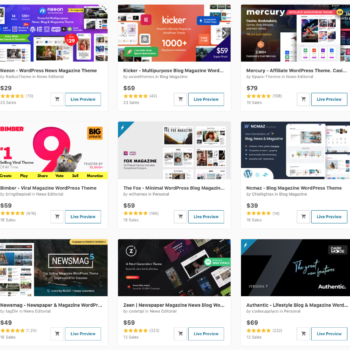So, the big day has come. You have got your idea for a hit blog. You have the domain name and website all set up. You’re just not sure how to launch a new blog.
Many blogs that go on to be successful start off with a launch. Rather than just starting out with a blank website with no content, a blog launch occurs after you have built up a number of blog posts before making it public.
If this is your first blog, congratulations! This post you through the steps to make sure your blog is ready to launch high into the sky, instead of staying on the launchpad.
Types of Blog Launches
Immediate
There are essentially two types of blog launches. The immediate blog launch is the first type. This type of launch is characterized by excitement and a surge of motivation.
You quickly register a domain name and publish your first post on the same day. Things go well for about a week or two before you begin to lose interest as you do not have much traffic on your site. You might become discouraged and give up. This type of blog launch is all too common in the world of blogging. One fueled purely by excitement rather than by careful planning.
Planned
The second type of blog launch is the planned launch. This type of launch does not occur the same day as your great blog idea, unless you are a blog launching veteran. In that case, you are reading the wrong article.
Rather this type of launch is built up to. You would plan out what content you want to have populating your blog as soon as it is visible to the public. You would also perform research on keywords, select images that are appealing to both you and the readers, and create a blogging schedule that works for you.
Planning out the launch of your blog will help give it a much-needed boost as new blogs are popping up left and right. If you hit the ground running with a well-made, visually appealing, content rich blog, then you will start well ahead of potential competitors.
Know Your Niche
Hopefully the whole reason you started your blog was to talk about something that interests you. Something that brings you joy and that you hope to share with others. Whether its fitness, video games, bird keeping, or interpretive dance, make sure that you are well versed in the topic you intend to write about. This is essential to build up credibility with your readers.
If you sound like you don’t know what you are talking about, then readers will be hard pressed to take your posts seriously. Having the appearance of competence in your chosen niche is essential in making sure your blog is successful in the wider environment.
A sub element of knowing your niche is knowing your audience. If your niche is covering new mainstream video games, it would be unwise to litter your posts with references from the 80s that your audience is unlikely to connect with. Likewise, if your blog caters to older history buffs, using modern slang will likely put them off.
No audience will be 100% homogenous in their age or cultural background. But it is wise to do some investigation into the types of people who tend to show interest in your niche to best tailor content to them. This will help you retain readers, allowing your blog to flourish.
Have a Backlog of Content
Before making your blog public, you would do well to have a decent number of posts already prepared for your blog. The amount depends on how long each post you make is. If your posts are just 500 words, then you would be well served to have about 25 to 30 posts ready when your blog goes public. When your posts stretch to well over 2000 words, closer to 10 or 15 posts will suffice.
What matters is that you already have a wealth of content for your readers to digest upon launch. This will help readers to identify with your niche, as well as decide if your style of writing appeals to them. Starting a blog with just one post and going from there is sadly not the way to go about launching your blog anymore.
Make a Schedule
Having a plan is always the best way to approach a task. And relying on motivation as the sole source of content for your blog is a surefire way to watch it fail to make waves. Instead of motivation, have discipline when it comes to writing your blog posts.
Create a blog content calendar according to your desired frequency of posting. This will help keep you more organized, consistent, and on track. Set aside time for making titles, performing research, finding keywords, and other more mundane tasks that come with good blog housekeeping.
Equally important is setting aside time to create content for your blog. Do not rely on random flashes of motivation or inspiration, have a routine. Set aside the same time every week, or even every day for content writing. Schedule when you want posts to go live, either manually with your own calendar. Or you can automate the process if the service you are using has the option for that.
Optimize Your Titles
Spend time crafting enticing headlines for your blog posts. After all, it is the number 1 reason why blog posts get clicked on! Most blogs live and die by search engine algorithms, though this is not a reason to despair. An algorithm is by nature consistent in how it operates, meaning that you can make it work for you, instead of struggling against it.
The practice of making your blog algorithm friendly is known under the broad term of search engine optimization, or SEO for short. One of the major facets of SEO is your title. It needs to be something that someone would reasonably search out on their own. Titles like “How to bake bread” or “What is inside sunscreen?” are good examples of titles that align with search algorithms well.
What keywords you place in your title and article will depend on the niche you have chosen. However, researching what keywords other bloggers in the niche are using is a good way to start.
Make Sure Your Website Works
This article assumes that you have already decided on a hosting platform and have decided to set it up. You don’t need to be a back-end web developer to set up a blog, but you can do some troubleshooting of your own before your blog goes public. Just to make sure all the bells and whistles you have invested in work.
Make sure every link on your blog leads to the proper page, that all your images are formatted properly, and that your contact information is spelled correctly. Nothing is more embarrassing than having technical difficulties on launch day. So testing the features of your blog before going public can help to avert that potential situation.
Website Speed Test: Analyze the load speed of your blog and learn how to make it even faster.
Mobile Responsive Test: Is your web page mobile-friendly?
Have a Social Media Presence
Your blog is a product. And like any good product it needs to be advertised. Creating social media accounts on sites like Twitter and Facebook are good ways to spread the word about your blog. Have these social media sites for your blog be distinct from any personal social media you might have. Although including a link to your blog on your social media or personal accounts is also a good idea.
Make sure these accounts are up and running before your blog launches. Posting excerpts of your content, with links back to the article is a good way to generate traffic both for your social media, as well as the blog itself.
If you read other blogs that fall into the same niche as your own, interact with them on social media. Like, retweet, share, comment, etc. This will help get your name out there, and draw in readers who are already confirmed to be interested in the niche that you plan to blog in.
Do not be spammy about it though. Add constructive thoughts to conversations on social media and do not link back to your blog unless someone asks for it directly. If you go around spamming your blog URL on the pages of other bloggers, then you will likely be blocked and prevented from interacting with them any longer.
Stick With It!
Unless you get incredibly lucky, your blog is not going to become a hit overnight. It could take weeks or months of diligent content creation to build up an audience to your liking, but perseverance is your best friend in this case.
Blogging is incredibly rewarding. Especially when you write about topics that are dear to you. Having other people show interest in your niche is one of the best feelings in the world, so keep at it! The most important part of your blog is you after all. Without you, your blog would not exist. So do not give up and write to your heart’s content.









People reacted to this story.
Show comments Hide commentsDefinitely bookmarking this site. Thanks!
Very helpful tips. Thank you 🙂